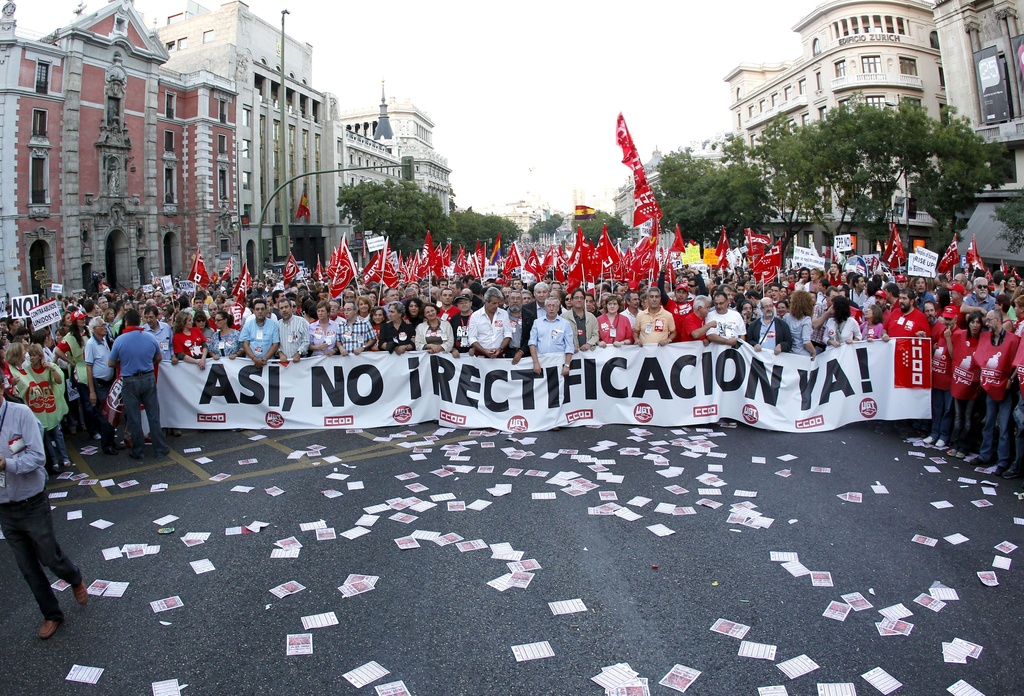
Switzerland is a “star of the recovery show”

British historian Niall Ferguson has praised Switzerland for its economic recovery strategy, while calling for better international coordination of exchange rates.
The academic, who teaches at Harvard and the London School of Economics, was in Geneva on Thursday for the presentation of the Latsis Prize, one of the most renowned research accolades in Switzerland.
Ferguson, who describes himself as a “liberal fundamentalist”, gave a talk at Geneva University on “Power and Finance – the political consequences of the current financial crisis”.
swissinfo.ch: Tens of thousands of people have recently been protesting across Europe against government austerity measures. What’s your view on these developments?
Niall Ferguson: There is no question that there is going to be turbulence and this is a relatively early stage of the game. You can’t borrow on the scale governments have been doing indefinitely. The Greeks, Irish and Portuguese have all discovered that the hard way.
Governments have to bring their finances under control in the wake of the crisis or risk a painful punishment by the bond market. In trying to stabilise public debt the International Monetary Fund and others have shown that European governments have to make really significant fiscal adjustments of between six and 12 per cent of GDP – a huge amount of fiscal tightening – and whether you do that by tax increases or cuts in spending, there will be losers. People will have to pay. There are no free lunches when it comes to fiscal stabilisation.
What we see today is a contest between public sector unions – the obvious targets for any governments wanting to save money – and the potential tax payers who will be hit if the cuts aren’t made. But this is often magnified by television.
swissinfo.ch: Switzerland seems to have weathered the storm slightly better than others…
N.F.: Switzerland is in fact one of the stars of the recovery show. It is an advertisement for the benefits of a relatively conservative fiscal policy.
Rather than running huge deficits and stimulus packages, the Swiss sought to consolidate their position and I think that’s one reason why they have done rather well – much better than many people expected given the size of the financial sector and the problems of big banks like UBS.
I think Switzerland is right to stay out of the euro. I think it has been an experiment that has been fraught with risk for member states and it’s going to be extremely hard to keep the system on the road at this point as the sovereign debt problem is far from over.
But the price of being virtuous, successful and outside the euro-zone is that the [Swiss franc] has appreciated. And in a world of competitive devaluation where many countries are quite deliberating intervening to keep their currencies cheap, it’s very hard to know what Switzerland can do.
I think the only answer is international coordination. By that I don’t mean Switzerland should join the EU, but the G20 should be meeting to end this race-to-the-bottom and to create some new framework for exchange rate stability.
The biggest danger for the global economy right now is every government joining in a kind of money-printing contest in the hope of securing some ephemeral advantage from cheap exports. That’s not just bad for Switzerland; it’s actually bad for the whole world economy.
swissinfo.ch: What are the most immediate political consequences of the economic crisis in the US?
N.F.: There are a few familiar dimensions [to the situation in Europe], but the less familiar is represented by the populist movement that is increasingly making the running as the mid-terms approach under the banner of the Tea Party. This is an interesting phenomenon as we’ve seen this movie before; after the big financial crisis of the Great Depression and the 1873 crisis, US politics was disrupted by populist movements of various shapes, sizes and stripes.
For some people the Tea Party is great news, as it’s energised the Republican vote but I think this could be one of those runaway trains that does more than the Republican establishment wants and shifts the party on a series of issues sufficiently far to the right to take it right out of the centre ground of politics.
swissinfo.ch: Your new book “Financier: The Lives and Time of Siegmund Warburg” is just out. What can modern banking and bankers learn from someone like Warburg?
N.F.: Siegmund Warburg, who spent the last decade of his life at Blonay in Switzerland, was the personification of a different era of banking. His favourite phrase was “haute banque”, which meant that there was a certain high financial style of doing things but which was quite different from stock market speculation and transaction-based banking.
For Warburg banking was about relationships. The relationship between bank and client was like the one between a doctor and a patient. Warburg was not someone obsessed with the bottom line. The key for him was to run the bank with the highest ethical and aesthetic standards.
He had some distinctive experiences like hyper-inflation, deflation and the rise of the Nazis in inter-war Germany. [But] if today’s generation of bankers could learn from Warburg’s career we might just avoid a re-run of this crisis in the next ten years.
Niall Ferguson (April 18, 1964, Glasgow) is a British historian who specialises in financial and economic history. He was educated at Oxford University, before embarking on an academic and media career.
He is the Laurence A. Tisch Professor of History at Harvard University as well as William Ziegler Professor of Business Administration at Harvard Business School, and also currently the Philippe Roman Chair in History and International Affairs at the London School of Economics.
He has written best-selling books on the history of finance and empire, and presented documentaries on television. His counterfactual approach to history has aroused debate.
He is currently working on a “warts-and-all” independent biography of Henry Kissinger – “perhaps the great strategic figure of the post-war period” – to be published in 2012.
He has also been invited by the coalition British government to revitalise the national history curriculum “doing for history what Jamie Oliver has done for school food – make it healthy, and so they actually want to eat it”.
The National Latsis Prize is one of Switzerland’s most prestigious scientific awards. It is awarded annually on behalf of the Geneva-based Latsis Foundation by the Swiss National Science Foundation. The SFr100,000 ($98,200) award honours the outstanding scientific achievements of a research scientist under age 40 working in Switzerland.
The Latsis Foundation, a charitable organisation, was established in 1975 by the Greek Latsis family in Geneva.
The Foundation currently sponsors six awards: four university prizes, worth SFr25,000 each, the National Latsis Prize and the European Latsis Prize, of SFr100,000 each.
This year’s four university prizes, announced on Thursday, went to physics researcher Mario Agio from the Federal Institute of Technology in Zurich, economist Christian Thöni from St Gallen University, molecular biologist Carlos Canto Alvarez from the Federal Institute of Technology in Lausanne and Violeta Seretan from Geneva University for her research into IT linguistics.

In compliance with the JTI standards
More: SWI swissinfo.ch certified by the Journalism Trust Initiative





























You can find an overview of ongoing debates with our journalists here . Please join us!
If you want to start a conversation about a topic raised in this article or want to report factual errors, email us at english@swissinfo.ch.